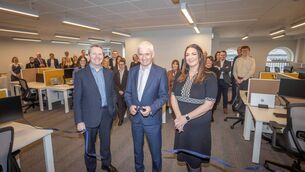US investment’s role in regional development in Ireland

Deloitte Ireland recommends that Ireland's grant-supported R&D activities should include AI, Blockchain, Data Analytics as well as a Carbon Neutrality and introduce an enhanced R&D tax credit in excess of 30% (“qualified refundable tax credits” for Pillar Two) related to reliably safe development, implementation and use of AI.
, tax partner, Deloitte, looks at the many positive impacts of the mutually beneficial historic US-Irish trade relationship

US investment continues to play a central role in the regional development agenda in Ireland and is reflected in the US-Ireland Business 2024 Report by the American Chamber of Commerce Ireland which points to 480 US operations in regional locations in Ireland resulting in 118,000 people directly employed in such locations.
The global environment in which Ireland competes for Foreign Direct Investment (“FDI”) is constantly evolving as there is increased uncertainty both from an economic and political perspective which has a direct impact on the timing, scale, and location of FDI investments. Despite these headwinds, in 2024 there was significant regional employment growth reported by Ireland’s inward investment agency, IDA Ireland in its 2024 Annual Report.
From a regional perspective, Ireland secured 234 FDI investment wins in 2024, delivering record level of R&D investment. The majority of the FDI investments reported were regional investments with 59% of FDI investments located outside of Dublin. This is an increase in regional investments from 53% last year and it is worth noting that 69 investments were from new-name or first-time investors, strongly indicating Ireland’s ongoing attractiveness as an FDI location.
The continued impact of inward investment in the regional economy also goes beyond direct headcount figures, as IDA Ireland figures would suggest that as many as eight jobs are created in the economy for every ten created through inward investment and IDA client companies.
Expenditure in the Irish economy is further driven by such inward investment and in 2023 expenditure within the economy by FDI companies increased by 6.5% to €38.6billion showcasing the resilience and adaptability of Ireland’s economic framework. The National Development Plan (2021 — 2023) successfully accommodates for growth by investment in our rural towns and villages, and by ensuring the cities of Cork, Galway, Limerick and Waterford grow through sustained investment so it will become possible to deliver more public transport to people and support regional enterprise development, research and innovation.
As noted in Deloitte’s Tech Trends report for 2025, Artificial Intelligence (“AI”) is the common thread of everything we do. As a result, leaders and organisations in Ireland are building distinct facets of the future, today, through emerging technology innovations. In addition to the evolution of AI, Ireland has also affirmed its reputation as a location for the development of innovative technologies, global business services and products through a record level of R&D investment valued at €1.9 billion across 64 projects which was approved by IDA Ireland in 2024.
Deloitte Ireland LLP’s Pre-Budget 2025 submission included recommendations including the suggestion that qualifying R&D activities should be expanded to include AI, Blockchain, Data Analytics and also Carbon Neutrality and introduce an enhanced R&D tax credit in excess of 30% (“qualified refundable tax credits” for Pillar Two) for certain categories of expenditure related to reliably safe development, implementation and use of AI. These suggestions were put forward to enhance tax policy for R&D measures to support innovation as the R&D sector is a cornerstone of Ireland's future prosperity, driving innovation, economic growth, achieving sustainability targets and regional development.
The R&D tax credit is a fundamental tax policy tool for fostering innovation and growth in indigenous companies and encouraging foreign direct investment from US MNCs in our economy. Finance Act 2023 provided for an increase in the R&D tax credit rate from 25% to 30% to ensure our tax credit remains competitive against the backdrop of international tax changes which we will discuss later in this article, while Finance Act 2024 provided for an increase in the first-year payment threshold from €50,000 to €75,000, which is a valuable accelerated cash-flow for companies.
These amendments delivered certainty to MNE’s currently undertaking R&D in Ireland or considering investing in Ireland and ensured that this important incentive remains one of the leading regimes globally and that Ireland remains competitive as a location for investment in STEM and provides continued support to over 300,000 FDI jobs in Ireland. Innovation is driven in Ireland through AI and R&D, but it is also worth noting that Ireland is home to highly skilled talent.
In order for Ireland Inc. to achieve its targets in the areas of, digitalisation, and sustainability focused on decarbonisation, developing advanced cutting-edge technologies need to be incentivised. Deloitte Ireland LLP looks forward to proactively engaging with the Department of Finance on the proposed public consultation on R&D which is expected to be released in the coming months.
The corporate tax regime in Ireland is both transparent and stable, which provides certainty for investors. The Irish corporation tax rate of 12.5% that applies for trading income remains unchanged, while the recently introduced OECD Global Anti-Base Erosion Model (Pillar Two) rules provide for a mechanism whereby the effective tax rate for companies in scope (i.e. companies with a turnover of greater than €750m). While this represents an increased rate for those companies in scope, corporate tax is just one part of the overall Ireland Inc. offering, and this is the message we continue to hear from US MNC investors.
From a tax perspective another area of focus is the high income tax rates and these can act as a barrier when US MNC’s are looking to hire or relocate talent to Ireland. As noted in Deloitte’s Pre-Budget 2025 submission, there are opportunities to improve the personal tax regime in Ireland and thus further increase FDI employment from US MNCs.
Ireland’s high personal tax rates and the cost of doing business which includes labour costs, remain a disincentive to businesses locating in Ireland, to employees taking on additional work and to foreign-based talent (including Ireland’s diaspora) relocating or returning to Ireland. Our combined top personal tax rates of 52% — 55% remain among the highest in the EU (Top 10).
However, Ireland has several reliefs which should be developed further to ensure that US companies continue to choose regions in Ireland, one of which includes the Special Assignee Relief Programme (“SARP”) relief. Increasing numbers indicate that SARP bolsters Ireland's reputation as a favourable destination for foreign investment, bolstering economic growth.
A competitive and attractive SARP regime can ultimately result in increased investment into Ireland, increased jobs creation, and while the SARP relief itself may reduce a specific individual’s personal tax burden, overall Ireland should achieve increased tax receipts through the additional corporate tax and personal taxes generated from the business and jobs that have been secured.
A substantial income tax and USC reform which would broaden the tax base and make the personal tax regime attractive for workers and businesses is vitally important in a highly mobile and competitive world and during a time of demographic transition. This competitive advantage will enhance Ireland's global competitiveness, enticing US multinational corporations to establish operations, thereby boosting employment and investment.
Our economy must be adequately served to ensure that Ireland remains a competitive location in which to invest and grow businesses from both an inward investment and domestic business perspective.
This sentiment is certainly borne out in the AmCham Quarterly FDI Insights survey where 40% of respondents pointed to housing as the number one challenge for Ireland to overcome for their respective companies to expand here.
The focus in this regard has very much centred on critical infrastructure projects, while not just regional specific, then Minister for Finance, Mr Jack Chambers during his Budget Day 2025 speech detailed “the future economic performance of the State will depend on how the public infrastructure programme is prioritised and delivered over the next decade” and committed €3 billion in spending in the areas of water infrastructure, housing and electricity grid infrastructure.
This will no doubt have a positive knock on effect for regional locations and is critical to supporting the next wave of regional investments as other areas of our investment offering face additional pressures from overseas competitors.
The increased levels of remote and hybrid working factor into locational decision-making by US MNCs and alters the trade-offs between urban and regional locations and creating an advantage for employees as they may no longer need to locate in urban areas. In recent years, a greater investment in the regions by government as part of the National Development Framework and supported by local authorities has cultivated a highly educated workforce, a great quality of life and providing enhanced infrastructure connectivity.
A key ambition of the National Development Plan is to focus on the delivery of balanced air connectivity to support Ireland’s regional airports including Cork and Shannon to ensure Ireland’s regions remain a location of choice for US multinationals. Ireland’s education system in the regions is strong with colleges such as University College Cork (ranked in the top two percent of universities globally), University of Limerick and the University of Galway where 96% of graduates gain employment within 6 months of graduation.
The US-Ireland Business Report also notes that of the 256,000 students enrolled in higher education last year, 200,000 were from regions outside of Dublin and 152,000 were enrolled in institutions in regional locations. As such the availability of an existing well educated talent pool together with a rich pipeline of talent continue to attract US MNC’s to regional locations.
When Ireland wins, regions win Even though significant risks persist, in the form of political risks, high income tax rates, talent attraction, and critical infrastructure shortages, the fundamentals for investment and innovation remain the same. As recent history has taught us, even when faced with uncertainty businesses cannot afford to stand still: change is the only constant.
Business leaders drive opportunities for growth through expansion into new markets and continuing to redefine how they serve their customers in local markets, embed sustainability into business strategy and ensure that they have the right talent to innovate and compete.
In short, Ireland has benefited significantly from US inward investment. While Ireland Inc. is well placed to continue to win new investments in an increasingly competitive environment, it is important that government policy decisions continue to enhance Ireland Inc’s FDI offering. When Ireland Inc wins, regions win too.







